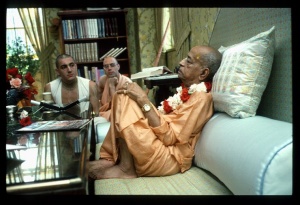CC Madhya 8.142 (1975): Difference between revisions
(Vanibot #0027: CCMirror - Mirror CC's 1996 edition to form a basis for 1975) |
(Vanibot #0020: VersionCompareLinker - added a link to the Version Compare feature) |
||
| Line 2: | Line 2: | ||
<div style="float:left">'''[[Sri Caitanya-caritamrta (1975)|Śrī Caitanya-caritāmṛta (1975)]] - [[CC Madhya (1975)|Madhya-līlā]] - [[CC Madhya 8 (1975)|Chapter 8: Talks Between Śrī Caitanya Mahāprabhu and Rāmānanda Rāya]]'''</div> | <div style="float:left">'''[[Sri Caitanya-caritamrta (1975)|Śrī Caitanya-caritāmṛta (1975)]] - [[CC Madhya (1975)|Madhya-līlā]] - [[CC Madhya 8 (1975)|Chapter 8: Talks Between Śrī Caitanya Mahāprabhu and Rāmānanda Rāya]]'''</div> | ||
<div style="float:right">[[File:Go-previous.png|link=CC Madhya 8.141 (1975)|Madhya-līlā 8.141]] '''[[CC Madhya 8.141 (1975)|Madhya-līlā 8.141]] - [[CC Madhya 8.143 (1975)|Madhya-līlā 8.143]]''' [[File:Go-next.png|link=CC Madhya 8.143 (1975)|Madhya-līlā 8.143]]</div> | <div style="float:right">[[File:Go-previous.png|link=CC Madhya 8.141 (1975)|Madhya-līlā 8.141]] '''[[CC Madhya 8.141 (1975)|Madhya-līlā 8.141]] - [[CC Madhya 8.143 (1975)|Madhya-līlā 8.143]]''' [[File:Go-next.png|link=CC Madhya 8.143 (1975)|Madhya-līlā 8.143]]</div> | ||
{{CompareVersions|CC|Madhya 8.142|CC 1975|CC 1996}} | |||
{{RandomImage}} | {{RandomImage}} | ||
==== TEXT 142 ==== | ==== TEXT 142 ==== | ||
| Line 20: | Line 19: | ||
<div class="synonyms"> | <div class="synonyms"> | ||
akhila-rasa-amṛta-mūrtiḥ—the reservoir of all pleasure, in which exist all the mellows of devotional service, namely śānta, dāsya, sakhya, vātsalya and mādhurya; prasṛmara—spreading forth; ruci—by His bodily luster; ruddha—who has subjugated; tārakā—the gopī named Tārakā; pāliḥ—the gopī named Pāli; kalita—who has absorbed the minds of; śyāmā—the gopī named | akhila-rasa-amṛta-mūrtiḥ—the reservoir of all pleasure, in which exist all the mellows of devotional service, namely śānta, dāsya, sakhya, vātsalya and mādhurya; prasṛmara—spreading forth; ruci—by His bodily luster; ruddha—who has subjugated; tārakā—the gopī named Tārakā; pāliḥ—the gopī named Pāli; kalita—who has absorbed the minds of; śyāmā—the gopī named Syāmā; lalitaḥ—and the gopī named Lalitā; rādhā-preyān—dearmost to Śrīmatī Rādhārāṇī; vidhuḥ—Kṛṣṇa, the Supreme Personality of Godhead; jayati—all glories to. | ||
</div> | </div> | ||
| Line 27: | Line 26: | ||
<div class="translation"> | <div class="translation"> | ||
" 'Let Kṛṣṇa, the Supreme Personality of Godhead, be glorified! By virtue of His expanding attractive features, He subjugated the gopīs named Tārakā and Pāli and absorbed the minds of Śyāmā and Lalitā. He is the most attractive lover of Śrīmatī Rādhārāṇī and is the reservoir of pleasure for devotees in all devotional mellows.' | |||
</div> | </div> | ||
Latest revision as of 19:46, 27 January 2020

A.C. Bhaktivedanta Swami Prabhupada
TEXT 142
- akhila-rasāmṛta-mūrtiḥ
- prasṛmara-ruci-ruddha-tārakā-pāliḥ
- kalita-śyāmā-lalito
- rādhā-preyān vidhur jayati
SYNONYMS
akhila-rasa-amṛta-mūrtiḥ—the reservoir of all pleasure, in which exist all the mellows of devotional service, namely śānta, dāsya, sakhya, vātsalya and mādhurya; prasṛmara—spreading forth; ruci—by His bodily luster; ruddha—who has subjugated; tārakā—the gopī named Tārakā; pāliḥ—the gopī named Pāli; kalita—who has absorbed the minds of; śyāmā—the gopī named Syāmā; lalitaḥ—and the gopī named Lalitā; rādhā-preyān—dearmost to Śrīmatī Rādhārāṇī; vidhuḥ—Kṛṣṇa, the Supreme Personality of Godhead; jayati—all glories to.
TRANSLATION
" 'Let Kṛṣṇa, the Supreme Personality of Godhead, be glorified! By virtue of His expanding attractive features, He subjugated the gopīs named Tārakā and Pāli and absorbed the minds of Śyāmā and Lalitā. He is the most attractive lover of Śrīmatī Rādhārāṇī and is the reservoir of pleasure for devotees in all devotional mellows.'
PURPORT
Everyone has a particular transcendental mellow by which he loves and serves Kṛṣṇa. Kṛṣṇa is the most attractive feature for every kind of devotee. He is therefore called akhila-rasāmṛta-mūrti, the transcendental form of attraction for all kinds of devotees, whether the devotee be in the śānta-rasa, dāsya-rasa, sakhya-rasa, vātsalya-rasa or mādhurya-rasa.
This is the opening verse of the Bhakti-rasāmṛta-sindhu, by Śrīla Rūpa Gosvāmī.